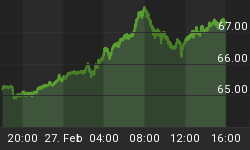Six weeks inside one of humanity’s biggest existential crises, hordes of businesses and corporate entities have quickly taken sides with many choosing to ditch their lucrative Russian market.Indeed, no less than 600 international companies have withdrawn from Russia in one of the most dramatic international corporate and political showdowns in modern history. Still, many businesses in Russia, the world’s 12th largest economy by GDP, have simply thrown up a smokescreen by making refugee donations but continued their businesses as usual. One of the United States’ biggest semiconductor companies belonged to the latter category, until recently.
After weeks of dilly-dallying, Intel Corporation (NASDAQ:INTC) announced late on Tuesday that it would become the latest company to suspend its operations or withdraw from Russia following its invasion of Ukraine.
"Intel continues to join the global community in condemning Russia's war against Ukraine and calling for a swift return to peace," the company said in a statement.
Intel says it’s working to support its 1,200 Russian employees and has "business continuity measures to minimize disruption to our global operations."
INTC surged to a 52-week high of $68.49 in the first half of April last year, challenging a peak of $69.29 reached in January of 2020 and close to the dot-com bubble level of the late 1990s and early 2000s. Unfortunately, INTC shares have been unable to sustain their upward momentum amid worries the firm had fallen behind the competition, including Nvidia Inc. (NASDAQ:NVDA) and AMD Inc. (NASDAQ:AMD).
But Intel is hardly alone.
Fortune has come up with four precise categories of U.S. companies’ stance towards Russia. As of early March 17, those categories broke down as follows:
1) Withdrawing all business: 150 companies completely halting Russian engagement.
2) Suspending Operations: 178 companies temporarily curtailing Russian operations while keeping return options open.
3) Reducing Activities: 74 companies scaling back some but not all operations and/or delaying investments.
4) Economic Collaboration: 34 companies digging in, defying demands for exit or reduction of activities.
Fortune notes that whereas category #1, withdrawing all business, deserve special commendation, it may be simpler for some companies in more “asset-light” sectors to sever ties immediately. Thus, most lawyers, consultants, accountants, sports leagues, and technology service providers have been quicker to act than some capital-intensive industrial companies or retailers with large local workforces. Of course, the firms that have chosen to divest massive assets, such as BP Inc. (NYSE:BP), Exxon Inc. (NYSE:XOM), and Shell (NYSE:RDS.A), deserve great recognition.
However, Fortune says some of the caution being exercised by entrenched U.S. companies in Russia is not so much a matter of putting profits first but rather is anchored in loyalty to dedicated workers and a concern for their well-being.
Some of it is misguided, too, : According to Jeffrey Sonnenfeld, senior associate dean and the Lester Crown professor of management practice at the Yale School of Management and Steven Tian, director of research for the Yale Chief Executive Leadership Institute via Fortune, some of U.S. companies that appear reluctant to leave Russia ‘‘represent a cognitive time-warp as this was the utopian strategic mindset of the bygone 1990s Perestroika age.’’
The authors opine that the careers of this generation of leaders advanced with the idealistic spirit of globalization, when Western brands such as Levi Strauss (NYSE:LEVI), McDonald’s Corp. (NYSE:MCD), Pepsi Inc. (NASDAQ:PEP), Coke (NYSE:KO), and Starbucks Corp. (NASDAQ:SBUX) were symbols of liberation and freedom to Russians linking East and West together in a harmonious world--a world that no longer exists.
In other words, don’t be too quick to judge why your favorite American company appears to be willingly supporting Russia’s war machine.
















